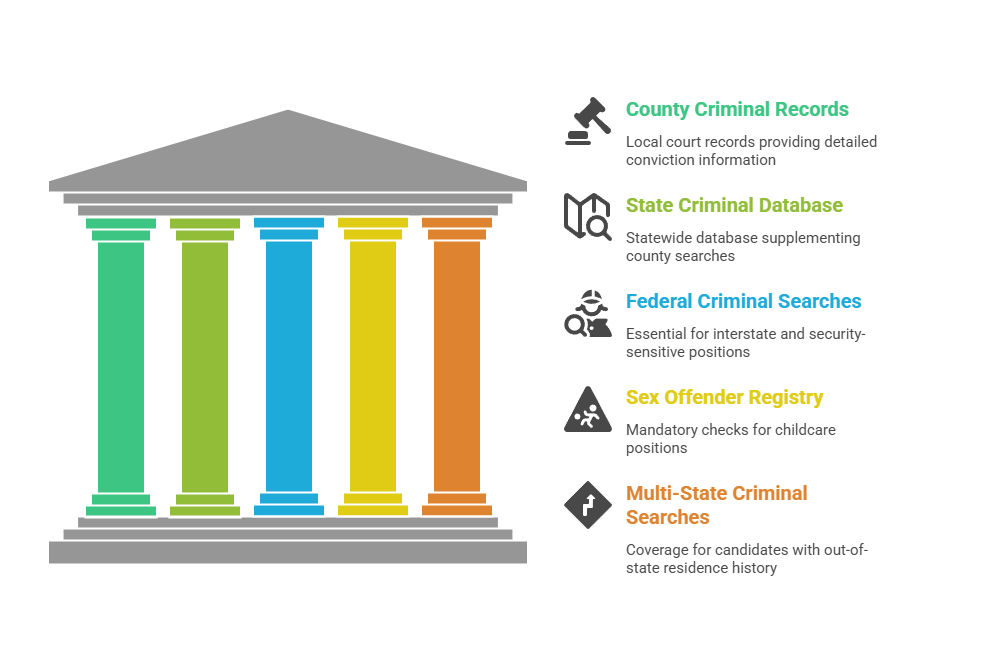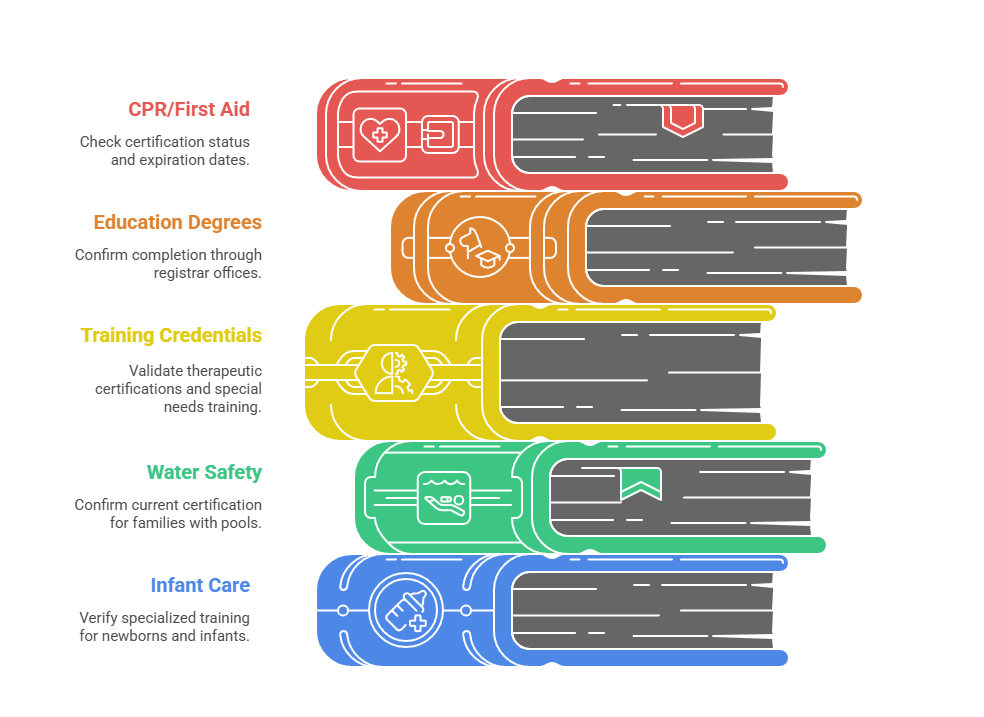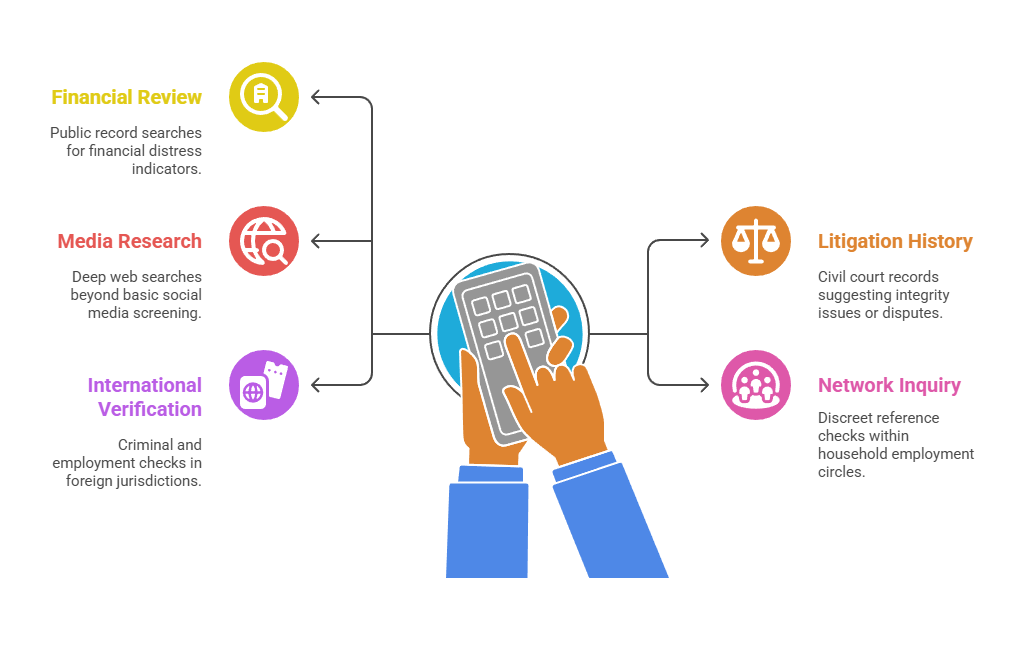New York nanny background checks require navigating a complex regulatory landscape where NYC's Domestic Worker Bill of Rights intersects with state childcare worker requirements and federal FCRA compliance standards. This comprehensive guide provides high-net-worth families, household managers, and family offices with actionable strategies for conducting thorough, legally compliant background verification while maintaining the discretion expected in luxury household management.
Key Takeaways
- New York City's Domestic Worker Bill of Rights imposes specific background check requirements that differ significantly from New York state standards, creating compliance obligations that extend beyond typical employment screening.
- Manhattan nanny hiring requires adherence to both NYC Local Law 33 notice requirements and federal FCRA regulations, mandating specific disclosure procedures before conducting background verification.
- Criminal history verification in New York must comply with Article 23-A fair chance hiring provisions, which restrict employers from blanket disqualification based on conviction records without individualized assessments.
- Brooklyn nanny background check services must include sex offender registry searches across New York state databases, as childcare positions fall under enhanced scrutiny categories for child safety protection.
- Westchester County childcare background checks operate under different municipal requirements than NYC, requiring families to understand jurisdiction-specific compliance obligations based on employment location.
- High-net-worth families should implement multi-layered verification protocols combining criminal records, employment history, reference verification, and social media screening to ensure comprehensive household security.
- New York state childcare worker checks require verification through the Statewide Central Register of Child Abuse and Maltreatment (SCR) for candidates working with children, adding an additional compliance layer.
- Professional background screening services specializing in domestic placement provide FCRA-compliant documentation, adverse action procedures, and ongoing monitoring capabilities that protect families from legal exposure.
Understanding New York's Unique Regulatory Framework
New York nanny background checks operate within a dual regulatory system. Municipal and state requirements create overlapping compliance obligations. This complex framework demands careful attention to jurisdictional differences.
NYC's Domestic Worker Bill of Rights establishes specific protections for household employees including nannies, housekeepers, and caregivers. These protections directly impact background screening procedures. Employers must provide written notice of screening policies and obtain explicit consent before conducting verification.
New York State's labor laws add another compliance layer through Article 23-A of the Correction Law. This provision governs how employers can use criminal history information in hiring decisions. The fair chance hiring framework prohibits automatic disqualification based on conviction records. Instead, it requires individualized assessments that weigh the nature of the offense, time elapsed, and relationship to job responsibilities.
NYC vs. New York State Requirements
The regulatory complexity intensifies for families employing nannies across multiple jurisdictions. A household manager coordinating staff for properties in Manhattan, the Hamptons, and Westchester County must navigate three distinct compliance frameworks. Understanding these variations is essential:
| Jurisdiction | Key Requirements | Regulatory Source |
| New York City | Written notice, explicit consent, Domestic Worker Bill protections | Local Law 149, NYC Administrative Code |
| New York State | Article 23-A individualized assessment, fair chance hiring | Correction Law Article 23-A |
| Westchester County | State standards without NYC additional requirements | New York State Labor Law |
Westchester County childcare background checks follow state standards without NYC's additional municipal requirements. Seasonal employees working in Suffolk County face different local ordinances. Understanding these jurisdictional variations prevents costly compliance failures and potential litigation.
Federal FCRA Compliance for Household Employers
The Fair Credit Reporting Act establishes mandatory procedures for any employer conducting background checks through third-party screening companies. Even high-net-worth families hiring a single nanny must comply with FCRA requirements. Professional background check services trigger these federal obligations.
FCRA compliance requires several critical components. First, families must provide a standalone disclosure document that clearly informs candidates about background screening. This disclosure cannot be embedded within employment applications or other documents. Second, candidates must provide written consent before any screening occurs. Third, specific adverse action procedures apply when background information influences hiring decisions.
When background information reveals concerns, FCRA adverse action procedures become mandatory. Families must provide pre-adverse action notice including a copy of the background report. They must also include a summary of FCRA rights. A reasonable waiting period follows (typically 5-7 business days). Then families can make final decisions while providing formal adverse action notice if proceeding with rejection.
Essential Components of Comprehensive Background Verification
Manhattan nanny hiring background verification extends beyond simple criminal record checks. Comprehensive screening encompasses multiple verification layers. Each component addresses specific risk factors and compliance requirements.
Professional screening services structure verification protocols based on position requirements and household security needs. Standard packages typically include criminal history searches, employment verification, and reference checks. Enhanced packages add education verification, social media screening, and ongoing monitoring services. Brooklyn nanny background check services offer customizable tiers that balance thoroughness with budget considerations.
The verification process should follow a systematic approach that maintains consistency across all candidates. This standardization protects families from discrimination claims while ensuring thorough evaluation. Documentation at each stage creates an audit trail demonstrating compliance with regulatory requirements.
Criminal History Searches
New York nanny criminal history verification requires multi-jurisdictional searches because no single database captures complete records. County-level criminal court searches provide the most accurate information. However, candidates who have lived in multiple locations require searches across all relevant counties.
Criminal search components should include:

- County criminal court records: Most accurate source for felony and misdemeanor convictions within specific jurisdictions
- New York State criminal database: Statewide conviction information that supplements county searches
- Federal criminal searches: Essential for candidates with interstate residence history or enhanced security positions
- Sex offender registry checks: Mandatory searches across New York state databases for any childcare position
- Multi-state criminal searches: Coverage for candidates with residence history outside New York
The lookback period for criminal searches typically extends seven years for most employment purposes. However, New York law allows consideration of older records for positions involving vulnerable populations. High-net-worth families often request comprehensive lifetime criminal searches for household positions with access to children and valuable property.
Employment and Reference Verification
Employment history validation reveals critical insights about work performance and reliability. Professional reference checks should address specific competencies including childcare philosophy and discipline approaches. Structured interviews uncover information that resumes and applications cannot provide.
Verification should extend to at least three previous employers or five years of work history. Gaps in employment history warrant additional inquiry. Unexplained absences may indicate undisclosed issues. International candidates require additional diligence including credential verification and reference checks with previous employers in their home countries when possible.
Education and Certification Validation
Westchester County childcare background checks should include education verification when candidates claim relevant credentials. Early childhood education degrees and child development certifications represent valuable qualifications. However, credential fraud appears more frequently than many families realize.
Professional certifications require special attention:

- CPR/First Aid certification: Verify current status and expiration dates through issuing organizations
- Early childhood education degrees: Confirm completion through registrar offices at claimed institutions
- Specialized training credentials: Validate therapeutic certifications, special needs training, and advanced childcare qualifications
- Water safety instruction: Confirm current certification for families with pools or waterfront properties
- Infant care certifications: Verify specialized training for positions involving newborns and young infants
These credentials often have expiration dates requiring periodic renewal. Verification should confirm current status rather than simply historical completion. Professional screening services maintain relationships with credentialing organizations that facilitate efficient verification.
Navigating Fair Chance Hiring Requirements

New York State Article 23-A establishes one of the nation's most protective fair chance hiring frameworks. This statute applies to all New York employers including private households. Many families remain unaware of their compliance obligations under these provisions.
The law requires individualized assessments before criminal history can justify adverse employment decisions. Blanket policies excluding candidates with any criminal history violate New York law. Instead, families must evaluate eight specific factors that balance legitimate security concerns with fair employment opportunities.
Article 23-A Assessment Factors
Individualized assessment requires documented evaluation of multiple considerations. The statute mandates analysis of specific factors that connect criminal history to job responsibilities. This process protects both employer interests and candidate rights.
The eight required assessment factors include:
| Factor | Evaluation Focus | Documentation Requirement |
| Position duties | Specific responsibilities and access levels | Detailed job description |
| Offense relationship | Connection between conviction and job functions | Written nexus analysis |
| Time elapsed | Years since conviction occurred | Timeline calculation |
| Candidate age | Age at time of offense | Date comparison |
| Offense seriousness | Severity and nature of criminal conduct | Court record review |
| Rehabilitation evidence | Post-conviction positive conduct | Candidate statements, references |
| Employment interest | Candidate's legitimate need for work | Consider on case basis |
| Employer interest | Household safety and security needs | Risk assessment documentation |
For New York state childcare worker checks, the individualized assessment process requires documented evaluation of how specific criminal offenses relate to childcare responsibilities. A decade-old shoplifting conviction bears minimal relationship to a nanny's ability to provide quality childcare. Recent domestic violence convictions raise legitimate concerns about behavioral patterns around children.
Families must document their reasoning when criminal history influences hiring decisions. Creating contemporaneous records demonstrates compliance with Article 23-A's individualized assessment requirements. These records become critical if employment decisions face legal challenges.
Exceptions for Childcare Positions
New York law recognizes heightened safety considerations for positions involving children and vulnerable populations. Certain exceptions to standard fair chance hiring restrictions apply. The Statewide Central Register of Child Abuse and Maltreatment (SCR) clearance represents mandatory screening for licensed childcare facilities.
While SCR checks aren't technically required for private household nanny employment, prudent families include them in comprehensive screening protocols. Certain criminal convictions create justifiable grounds for per se exclusions. Sex offenses involving minors, child abuse convictions, and violent felonies against vulnerable populations represent categories where families can justify exclusions without violating fair chance hiring principles.
Even these seemingly clear-cut cases require documented justification. The individualized assessment framework still applies. Professional screening services specializing in household placement understand these nuanced distinctions and structure protocols that maximize safety while maintaining legal compliance.
Premium Screening Services for High-Net-Worth Families
Professional background screening services provide critical value for Manhattan nanny hiring. They ensure FCRA compliance and access comprehensive databases unavailable to individuals. These services document verification procedures that protect families from legal exposure.
Selecting the right screening partner requires evaluation of several key factors. FCRA compliance capabilities form the foundation. Database coverage and accuracy determine information quality. Turnaround time affects hiring timeline efficiency. Customer service responsiveness impacts the overall experience. Experience with domestic placement screening ensures understanding of household-specific requirements.
Selecting FCRA-Compliant Partners
Reputable screening services maintain comprehensive compliance protocols. These include proper disclosure and consent procedures. They provide adverse action notification systems and dispute resolution processes. Clear documentation of database sources and search methodologies demonstrates quality standards.
The screening service market includes national consumer reporting agencies and boutique firms. National providers offer broad database access and established compliance systems. Specialized firms provide white-glove service and expertise in domestic worker screening nuances. Brooklyn nanny background check services conducted through specialized providers often include value-added services beyond basic verification.
Enhanced Due Diligence Protocols
High-net-worth families face unique security considerations that justify enhanced verification. Enhanced due diligence combines traditional background checks with investigative research techniques. These comprehensive processes help identify risks that standard screening might miss.
Enhanced verification components include:

- Financial background review: Public record searches revealing bankruptcies, tax liens, and judgments that indicate financial distress
- Litigation history searches: Civil court records suggesting integrity issues or patterns of disputes
- Media and internet research: Deep web searches across multiple platforms beyond basic social media screening
- Professional network inquiry: Discreet reference checks within household employment circles
- International background verification: Criminal and employment checks in foreign jurisdictions for international candidates
Financial background screening requires careful execution to avoid FCRA violations. New York City restricts credit check use for employment purposes under the Stop Credit Discrimination in Employment Act. However, public record searches revealing bankruptcies and judgments remain permissible under proper procedures.
Media research extends beyond basic social media screening. Sophisticated services employ trained investigators who conduct targeted research based on position requirements. This enhanced scrutiny typically applies to positions with extensive child interaction or access to multiple high-value properties.
Implementing Compliant Screening Procedures
Consistent, documented screening procedures protect families from discrimination claims. Written background check policies should specify which positions undergo screening. They should detail the verification components included and explain how information will be evaluated. Clear procedures for adverse action when necessary complete the framework.
The screening policy should be provided to all candidates early in the hiring process. NYC Domestic Worker Bill background screening requirements mandate that families inform candidates about policies. Obtaining clear consent before initiating verification satisfies legal notice requirements. This transparency builds trust with candidates while meeting regulatory obligations.
Creating Standardized Protocols
Standardized screening protocols ensure consistent treatment across all household staff positions. A household manager coordinating staff across Manhattan properties, Hamptons estates, and Westchester residences should apply uniform screening standards. These standards adapt for each jurisdiction's specific regulatory requirements while maintaining consistent core verification components.
Professional household staffing agencies maintain documented protocols that families can customize. Templates provide starting points that incorporate FCRA requirements and New York-specific provisions. Customization addresses individual family security concerns and position-specific risk factors.
Documentation and Record Retention
Proper documentation protects families throughout the employment relationship and potentially for years afterward. Background check records should be maintained separately from general personnel files. Secure storage with limited access prevents unauthorized disclosure of sensitive information.
Required documentation includes:
| Document Type | Retention Period | Storage Requirements |
| Disclosure forms and consent | 5 years (FCRA requirement) | Secure, limited access |
| Background check reports | 5 years (FCRA requirement) | Encrypted digital or locked physical |
| Reference check notes | Employment duration + 3 years | Confidential personnel records |
| Individualized assessments | Employment duration + 5 years | Legal compliance file |
| Adverse action notices | 5 years (FCRA requirement) | Separate compliance documentation |
FCRA requirements mandate five-year retention of background check records. New York labor laws add additional retention requirements for certain employment records. Digital record-keeping systems offer advantages for household managers coordinating multiple staff members. Cloud-based platforms with appropriate security enable centralized documentation while maintaining required confidentiality protections.
International Candidate Verification
International candidates represent a significant portion of the New York nanny workforce. They bring valuable language skills and cultural perspectives to household positions. However, verification requires additional steps and creative solutions for challenging jurisdictions.
Criminal background checks in foreign countries vary dramatically in availability and reliability. Some countries maintain accessible criminal databases. Others lack centralized records or restrict access to government agencies. European Union countries have improved criminal record access through coordinated information-sharing systems.
Foreign Credential Verification
Professional screening services specializing in international verification maintain networks of research partners. These partners can conduct local searches and verification in foreign jurisdictions. The process addresses unique challenges including language barriers and varying record-keeping practices.
Alternative verification strategies become necessary for countries with limited background check access:

- Extended reference checks with multiple previous employers and character references
- Review of police certificates that candidates can obtain from local authorities
- Character references from established community members or professional organizations
- Video reference interviews allowing real-time credibility assessment
- Embassy or consulate verification when available through diplomatic channels
Employment verification for international work history presents similar challenges. Video reference interviews with previous employers provide more reliable information than email or written references. These interviews allow interviewers to assess credibility and ask follow-up questions that written communications cannot address.
Immigration Status Verification
Federal immigration law requires all U.S. employers to verify work authorization through the Form I-9 process. This obligation exists independently from background check requirements. Common visa categories for household workers include B-1 domestic employee visas and J-1 au pair program participants.
Au pair candidates arriving through designated J-1 exchange programs undergo background screening by sponsoring agencies. However, families should understand the scope and limitations of this pre-arrival verification. State Department regulations require participating agencies to conduct criminal background checks, but verification standards vary across agencies.
Ongoing Monitoring and Post-Hire Verification
Employment verification doesn't end when a nanny accepts a position. Continuous monitoring services track post-hire arrests and criminal charges. These automated systems alert families to relevant developments. For high-net-worth families with elevated security requirements, ongoing monitoring provides peace of mind.
Continuous monitoring operates through database queries that periodically check identified records. When matches occur, the screening service notifies the family. This typically includes arrest information and charges. Court disposition may require additional research as proceedings progress.
Regular performance reviews provide opportunities to assess whether nannies continue meeting expectations. These reviews should include discussion of job responsibilities and childcare approaches. Documentation of performance reviews creates valuable records demonstrating attentiveness to household management.
Conclusion
New York nanny background checks require navigating complex regulatory frameworks where multiple compliance standards intersect. High-net-worth families must balance legitimate security concerns with legal restrictions on criminal history use. Professional screening services provide essential support by ensuring compliance and accessing comprehensive databases. By implementing standardized protocols and selecting experienced partners, Manhattan families can confidently conduct verification that protects their households while treating candidates fairly.
Frequently Asked Questions
What background checks are legally required for nannies in New York?
New York does not mandate background checks for private household nanny employment. However, prudent families conduct comprehensive verification including criminal searches, employment checks, and sex offender registry reviews. These screening components protect families from negligent hiring liability and represent standard practice in Manhattan nanny hiring.
How much do professional nanny background check services cost in NYC?
Professional New York nanny background checks typically range from $50-150 for basic screening to $300-800 for comprehensive verification. Enhanced due diligence services with international searches and ongoing monitoring can exceed $1,000-2,000 annually. Brooklyn nanny background check services structure tiered pricing allowing families to select coverage matching their requirements.
Can I reject a nanny candidate based on a criminal record in New York?
New York's Article 23-A requires individualized assessment before criminal history can justify rejection. Families must evaluate eight specific factors including the offense's relationship to job responsibilities and time elapsed. Convictions involving child abuse or sex offenses against minors create reasonable grounds for rejection when properly documented through individualized assessment.
How long does a typical nanny background check take in New York?
Standard New York nanny background checks typically complete within 3-7 business days. Multi-state searches may extend turnaround to 7-14 days depending on county court processing. International verification can require 3-6 weeks when including overseas criminal searches and employment verification.
What is the Statewide Central Register and do I need to check it?
The Statewide Central Register (SCR) is New York's database tracking substantiated child abuse and neglect reports. SCR clearance is mandatory for licensed childcare facilities but not technically required for private household employment. Many high-net-worth families include SCR checks as an additional safety measure.
Do NYC's Domestic Worker protections affect background check procedures?
NYC's Domestic Worker Bill of Rights requires written disclosure of background check policies and explicit candidate consent. These protections supplement federal FCRA requirements, creating a dual compliance framework. Professional screening services provide compliant disclosure templates satisfying both NYC and federal requirements.
Can I conduct social media screening on nanny candidates in New York?
New York law permits social media screening using publicly available information. However, employers cannot request passwords or require candidates to add supervisors as connections. Brooklyn nanny background check services conduct compliant screening by reviewing only public content for relevant red flags.
What should I do if a background check reveals concerning information?
When background checks reveal potentially disqualifying information, families must follow FCRA adverse action procedures. This includes pre-adverse action notice with a copy of the report, a waiting period for dispute resolution, and formal adverse action notice if proceeding with rejection. For criminal history, Article 23-A requires individualized assessment documentation.
Additional Resources
- New York State Article 23-A Correction Law: Fair Chance Hiring Requirements
https://www.nysenate.gov/legislation/laws/COR/752 - Federal Trade Commission: Background Checks and FCRA Compliance
https://www.ftc.gov/business-guidance/resources/using-consumer-reports-what-employers-need-know - NYC Domestic Workers Bill of Rights: Know Your Rights Guide
https://www.nyc.gov/site/dca/workers/worker-rights.page - New York State Office of Children and Family Services: Background Check Information
https://ocfs.ny.gov/programs/childcare/regulations/ - Consumer Financial Protection Bureau: Summary of FCRA Rights
https://www.consumerfinance.gov/consumer-tools/background-checks/
